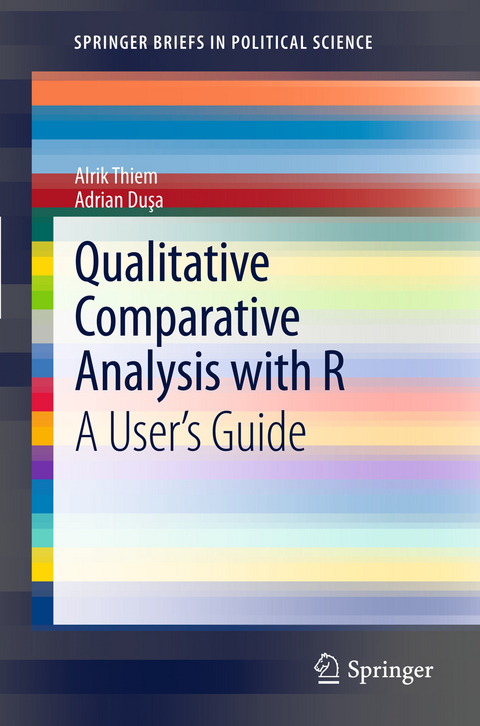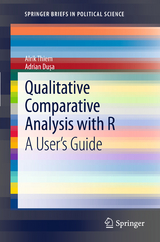Qualitative Comparative Analysis with R
A User’s Guide
Seiten
2012
|
2013 ed.
Springer-Verlag New York Inc.
978-1-4614-4583-8 (ISBN)
Springer-Verlag New York Inc.
978-1-4614-4583-8 (ISBN)
The development of Qualitative Comparative Analysis (QCA) by Charles Ragin has given social scientists a formal tool for identifying set-theoretic connections based on Boolean algebra. This book offers the first complete introduction on how to perform QCA in the R software environment for statistical computing and graphics with the QCA package.
Social science theory often builds on sets and their relations. Correlation-based methods of scientific enquiry, however, use linear algebra and are unsuited to analyzing set relations. The development of Qualitative Comparative Analysis (QCA) by Charles Ragin has given social scientists a formal tool for identifying set-theoretic connections based on Boolean algebra. As a result, interest in this method has markedly risen among social scientists in recent years. This book offers the first complete introduction on how to perform QCA in the R software environment for statistical computing and graphics with the QCA package. Developed as a comprehensive solution, QCA provides an unprecedented scope of functionality for analyzing crisp, multi-value and fuzzy sets. The reader is not required to have knowledge of R, but the book assumes an understanding of the fundamentals of QCA. Using examples from published work, the authors demonstrate how to make the most of QCA’s wide-ranging capabilities for the reader’s own purposes. Although mainly written for political scientists, this book is also of interest to scholars from other disciplines in the social sciences such as sociology, business, management, organization, anthropology, education and health.
Social science theory often builds on sets and their relations. Correlation-based methods of scientific enquiry, however, use linear algebra and are unsuited to analyzing set relations. The development of Qualitative Comparative Analysis (QCA) by Charles Ragin has given social scientists a formal tool for identifying set-theoretic connections based on Boolean algebra. As a result, interest in this method has markedly risen among social scientists in recent years. This book offers the first complete introduction on how to perform QCA in the R software environment for statistical computing and graphics with the QCA package. Developed as a comprehensive solution, QCA provides an unprecedented scope of functionality for analyzing crisp, multi-value and fuzzy sets. The reader is not required to have knowledge of R, but the book assumes an understanding of the fundamentals of QCA. Using examples from published work, the authors demonstrate how to make the most of QCA’s wide-ranging capabilities for the reader’s own purposes. Although mainly written for political scientists, this book is also of interest to scholars from other disciplines in the social sciences such as sociology, business, management, organization, anthropology, education and health.
1.Loading Neccessary Packages.- 2. Reading Data into R.- 3. Testing for Neccessity.- 4. Testing for Sufficiency 5.- Sufficiency: Parameters of Fit 6.- Plotting Results
| Reihe/Serie | SpringerBriefs in Political Science |
|---|---|
| Zusatzinfo | 20 Illustrations, black and white; XIII, 99 p. 20 illus. |
| Verlagsort | New York, NY |
| Sprache | englisch |
| Maße | 155 x 235 mm |
| Themenwelt | Sozialwissenschaften ► Politik / Verwaltung ► Politische Theorie |
| Sozialwissenschaften ► Soziologie ► Empirische Sozialforschung | |
| ISBN-10 | 1-4614-4583-3 / 1461445833 |
| ISBN-13 | 978-1-4614-4583-8 / 9781461445838 |
| Zustand | Neuware |
| Haben Sie eine Frage zum Produkt? |
Mehr entdecken
aus dem Bereich
aus dem Bereich
ein Vortrag
Buch | Softcover (2024)
Suhrkamp (Verlag)
10,00 €




